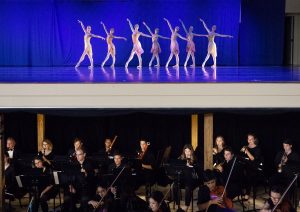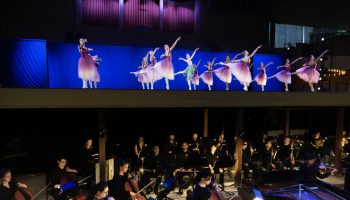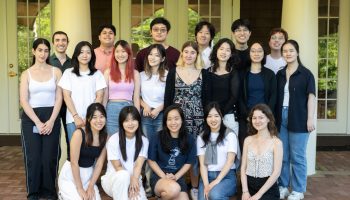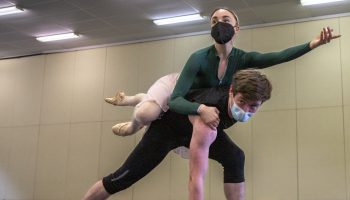
Tonight the Music School Festival Orchestra will finish its trifecta; after performing with student vocalists in Week Three and with the Chautauqua Symphony Orchestra last week, the MSFO tackles a new challenge — accompanying dancers.
At 8:15 p.m. tonight, July 22, in the Amphitheater, School of Dance students and the MSFO will join forces in a mid-season variety concert, guest conducted by Kazem Abdullah, the 2005 David Effron Conducting Fellow at Chautauqua Institution, and by Maria Fuller, this year’s Conducting Fellow. Abdullah will conduct the first three pieces, and Fuller will conduct the last.
“Music is kind of based on two things: the voice and dance,” Abdullah said. “There’s so many different kinds of dance forms — polkas, waltzes, marches — and I think the challenge is just making sure that the orchestra understands each style of dance and is able to play that effectively, so that the dancers can react to it and do what they need to do.”
The students in the MSFO will not be able to see the dancers from their positions in the pit, and must rely on the conductor to keep them aligned with the movements of the dancers.
“There’s an external force that’s dictating a lot of the timing, because (the dancers) need it to be timed in specific ways,” said MSFO cellist David Fenwick. “The rhythm needs to be made clearer.”
The concert will begin with Dmitri Shostakovich’s Piano Concerto No. 2 in F Major, Op. 102, featuring School of Music Piano Program student Vincent Ip. This is not a typical ballet piece, but Abdullah said that of all concertos in the repertoire, this is the one to choreograph due to its musical variety.
“It has so many different kinds of wonderful dance styles and marches that are typical of that Russian ballet school and that Russian tradition of dance,” Abdullah said.
However, choreographer Mark Diamond’s interpretation of the music — titled “Shostakovich” — is an abstract, neoclassical piece, with influences of contemporary dance styles. The piece explores motifs of victory, power, glory and innocence, Diamond said.
“Most of the music is so programmatic that it is perfect for the ballet I want to create,” he said. “The themes and motifs are so strong that the movement will be very expressive. Upon viewing, interpretation of personal meaning will lend itself to the audience members.”
“The Triumph of Neptune Suite” by Lord Berners, on the other hand, is a classic ballet piece, Abdullah said, also with a variety of dances — such as a Scottish dance and Russian waltz — and music styles.
The suite has rarely been choreographed, according to School of Dance resident choreographer and faculty member Michael Vernon. His visualization of the music, “Sunday Morning,” abstractly and subtly references “Downton Abbey” and classism in its costuming and patterns. The piece is danced en pointe.
“The Chairman Dances” by John Adams is taken from the contemporary American composer’s opera Nixon in China. The piece is played during a part of the opera when a state dinner between Richard Nixon and Mao Zedong is interrupted by Mao’s wife. It is a work of minimalism, and Abdullah compared it to techno music, due to its use of repetitive, rhythmic notes.
“It’s very diva-like, and there’s lots of sounds of foxtrot dance going on, with sounds of modern-day China,” said MSFO violist Maya Fields. “It’s an interesting piece of music.”
School of Dance Director of Contemporary Studies Sasha Janes’ new work, also named “Chairman Dances,” is a 14-person ensemble — six men and eight women — danced en pointe and is rather physical, with foxtrot and ballroom-esque movements.
“Don’t overthink it, just enjoy it,” Janes advised attendees.
Finally, “Ballet Music” from Charles Gounod’s opera Faust returns to a more traditional style, as it follows the conventions of typical French ballet music. George Balanchine choreographed Faust in 1975 for the Paris Opera Ballet; New York City Ballet premiered it in 1980.
The School of Dance students will perform “Walpurgisnacht,” a divertissement from Faust. It features demanding solos and corps de ballet work, but requires the dancers to remain energetic and fresh, yet striking with their musicality, according to Patricia McBride, director of ballet studies and master teacher.
This is the first time McBride — a contemporary of Balanchine — has staged the ballet for the School of Dance in 20 years.
The School of Dance will return to the Amp stage Tuesday night for “Nutcracker in July” with the CSO. The MSFO will be joined by students of the Chautauqua Voice Program on Aug. 5, in the Amp, conducted by Timothy Muffitt, artistic and music director for the School of Music.




